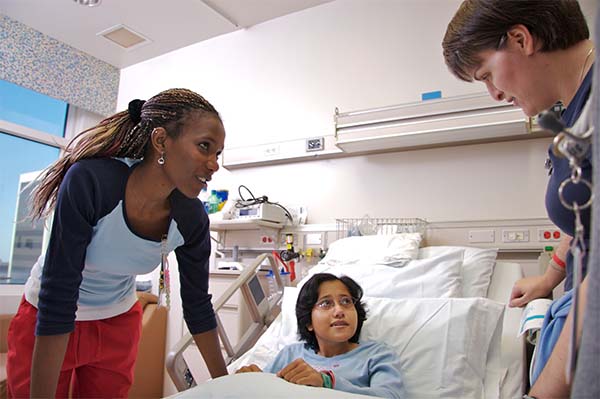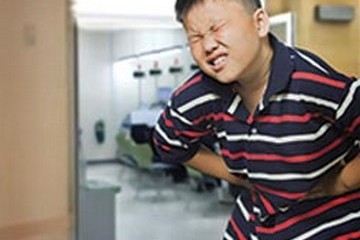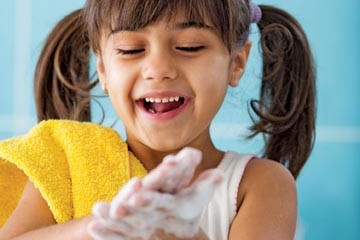Kids and the Stomach Flu
 Gastroenteritis, also known as the stomach flu, is inflammation in the digestive tract, including the stomach and the small and large intestines. It is very common, especially in children. Although gastroenteritis is sometimes called “stomach flu,” the seasonal influenza (flu) virus does not cause it. It is most commonly caused by a virus, such as the rotavirus, but may also be caused by bacteria or parasites. Vaccines are available to protect children from rotavirus. Your pediatrician can explain your options for vaccinating your baby.
Gastroenteritis, also known as the stomach flu, is inflammation in the digestive tract, including the stomach and the small and large intestines. It is very common, especially in children. Although gastroenteritis is sometimes called “stomach flu,” the seasonal influenza (flu) virus does not cause it. It is most commonly caused by a virus, such as the rotavirus, but may also be caused by bacteria or parasites. Vaccines are available to protect children from rotavirus. Your pediatrician can explain your options for vaccinating your baby.
CAUSES AND SYMPTOMS
Viruses that cause the stomach flu can be found in the vomit and diarrhea of infected people. They can live for a long time outside the body. People who are infected with the virus can spread it to objects they touch, especially if they do not wash their hands after using the bathroom or changing a diaper.
Symptoms of the stomach flu usually begin about one to two days after the virus gets into the body. Common symptoms include nausea, vomiting and watery diarrhea. Other possible symptoms are headache, fever, chills and stomachache.
THE DANGERS OF DEHYDRATION
“The most dangerous consequence of the stomach flu is dehydration,” says Dr. Jeffrey Ho, CHOC pediatric gastroenterologist. “Infants and young children in particular can become dehydrated very easily. Call your child’s doctor right away if you notice any signs of dehydration.”
Parents should watch carefully for signs of dehydration which include decreased urine output, dark-colored urine, dry skin, thirst and dizziness. In younger children, signs of dehydration are dry diapers (from a lack of urination), lack of tears, dry mouth, drowsiness and sunken fontanel (the soft spot on the top of an infant’s head).
FOR A SPEEDY RECOVERY
In most cases, your child should drink plenty of fluids and rest at home until the virus leaves their system. Helpful home care tips include:
- Have your child drink plenty of light fluids like ice chips, water, diluted fruit juice and broth. Start with small, frequent volumes and increase slowly as tolerated. For older children, keep in mind that sports drinks are high in sugar and may not be appropriate if they are extremely dehydrated.
- For infants and younger children, ask your child’s doctor if you should rehydrate your child with an oral rehydration solution such as Pedialyte or Enfalyte. These fluids have the right balance of water, sugar and salts. Some are available as popsicles.
- It can be dangerous to give plain water to a baby and too much plain water to kids of any age.
- Avoid drinks that contain milk and caffeine.
- Keep breastfeeding or feeding your baby formula, but only if they are able to keep it down.
- Once your child feels hungry again, start with mild, easy to digest foods.
In rare cases, children may need treatment for severe dehydration with IV (intravenous) fluids.
Stomach Flu or Appendicitis? What Parents Should Know
Parents often mistake appendicitis for a bad stomachache. It can be particularly difficult to diagnose in younger children, who can’t adequately describe their pain. CHOC pediatric surgeon Dr. Troy Reyna provides helpful insight for parents in this Q & A.

Podcast: Stomach Pain in Children

In this CHOC Radio podcast, CHOC pediatric gastroenterologist Dr. Mitchell Katz talks about the symptoms of stomach aches and pains in children. He says all pain is real and parents are the key in understanding why their child might be in pain. Dr. Katz also discusses the red flags that may be indicators of potentially more serious gastrointestinal issues.
Kids and Dehydration
When temperatures heat up, the risk of children becoming dehydrated intensifies. “Dehydration occurs when an athlete has less body fluid than they need,” says Dr. Chris Koutures.
What Is Colic?
Colic is the term used to describe uncontrollable crying in an otherwise healthy infant during its first three to four months of life. Sometimes colicky babies are responding to a discomfort in digestion.
Kids and Stomachaches
Stomachaches are very common and there are many causes, but the majority of kids with abdominal pain do not require urgent intervention.
Kids and Germs
Germs are everywhere, especially as we head into the cold and flu season. Learn how you can protect your kids from harmful bugs so they will not get sick.

















